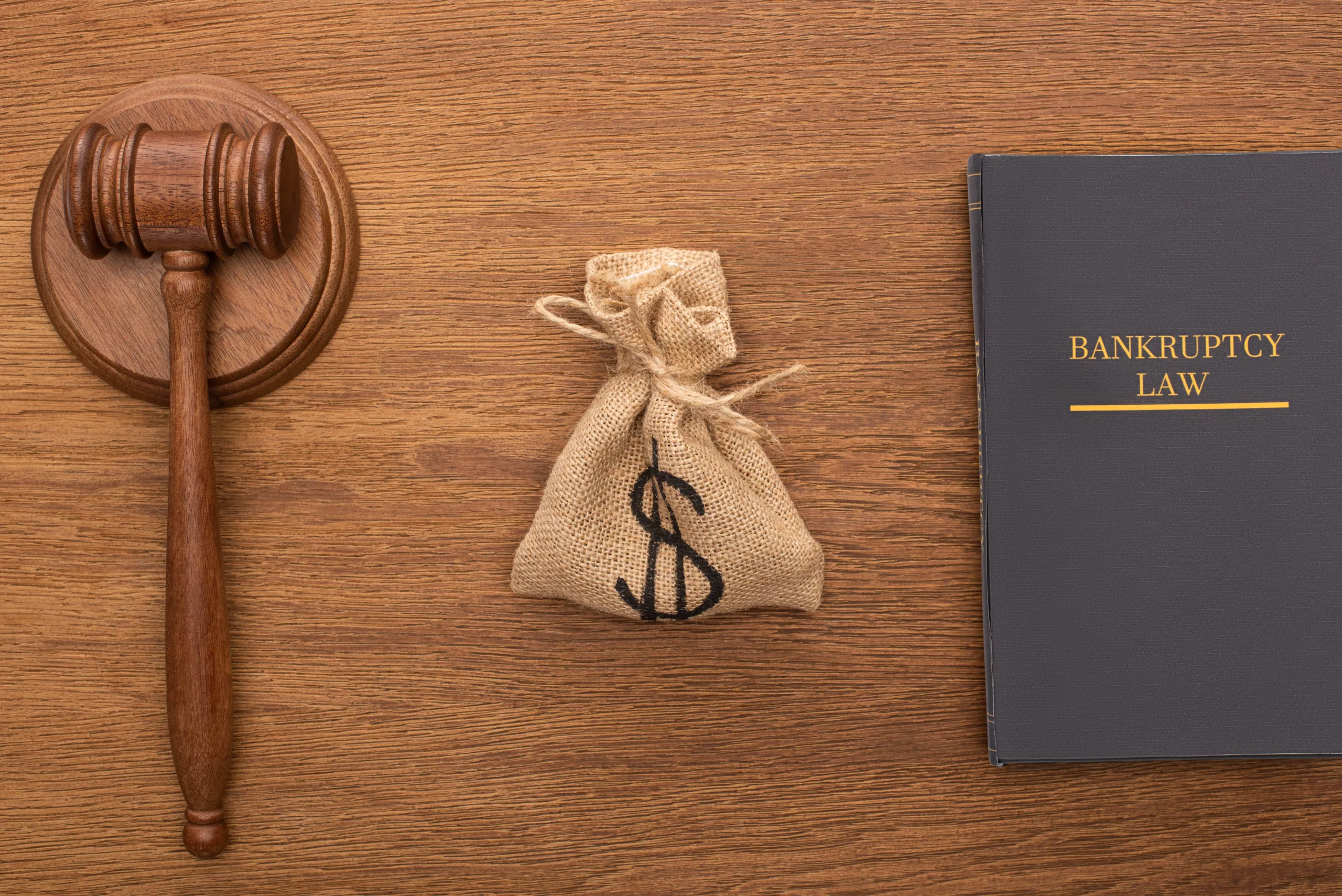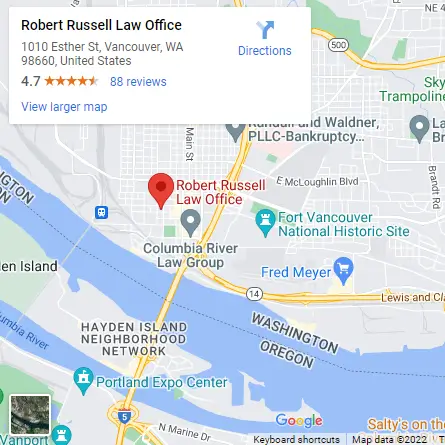Understand Federal Bankruptcy Exemptions Available in Vancouver, Washington
Financial difficulties can be overwhelming, leaving you feeling lost and unsure where to turn. Understanding federal bankruptcy exemptions is crucial if you are struggling with debt and considering bankruptcy. These exemptions safeguard your assets and protect them from liquidation by the bankruptcy trustee.
At Robert Russell Law Office, we are committed to providing compassionate and experienced legal counsel to help you navigate the complexities of bankruptcy. Our team of dedicated attorneys understands the emotional toll financial hardship can take and is here to guide you through the process every step of the way.
We offer free initial bankruptcy consultations by video or phone, allowing you to discuss your situation in the comfort of your home. During this consultation, one of our experienced bankruptcy attorneys will assess your financial situation, explain your bankruptcy options, and discuss the federal bankruptcy exemptions in Vancouver, WA, applicable to your case.
Short Summary:
- Bankruptcy is a legal process allowing individuals or businesses to reorganize finances or liquidate assets to pay debts.
- Bankruptcy exemptions are legal provisions that protect specific property from being included in the bankruptcy estate.
- Washington allows filers to choose between state and federal exemptions.
- Federal bankruptcy exemptions in Washington are available for cases filed between April 1, 2022, and April 1, 2025.
- The choice between Washington state and federal bankruptcy exemptions hinges on various factors. Those are the type and amount of exemptions, potential doubling for married couples, considerations for the homestead exemption, flexibility with the “wildcard” exemption, state-specific factors, alignment with asset protection goals, implications for future financial plans, and awareness of changes in exemption amounts over time.
Don’t let debt control your life. Contact Robert Russell Law Office today and gain clarity on your financial future. We’re here to help you navigate bankruptcy and recover the path to financial stability.
What is Bankruptcy?
Bankruptcy is a legal proceeding that allows individuals or businesses to reorganize their finances or, in some cases, liquidate their assets to pay off debts. It provides a mechanism for debtors to obtain relief from their creditors and get a fresh start.
Bankruptcy serves several important purposes:
- Provides relief to overburdened debtors: Bankruptcy allows individuals and businesses struggling to repay their debts to obtain a fresh start. By discharging or restructuring debts, bankruptcy can help debtors regain financial stability and move forward with their lives.
- Preserves value of going-concern businesses: In cases where a business is still viable but facing financial difficulties, bankruptcy can provide a mechanism for reorganization. That allows the company to restructure its debts, shed non-productive assets, and emerge as a stronger entity.
- Promotes fairness and equity among creditors: Bankruptcy ensures that creditors are treated fairly and equitably when a debtor cannot pay its debts. It prevents creditors from racing to seize assets, which could result in unfair distributions.
- Protects essential assets: Bankruptcy law protects certain assets, such as home equity, retirement accounts, and personal belongings, from liquidation. That helps ensure that debtors can maintain a basic standard of living and rebuild their finances.
What are Bankruptcy Exemptions?
Exemptions in bankruptcy refer to specific legal provisions that allow individuals filing for bankruptcy to shield certain types and amounts of property from being included in the bankruptcy estate. The bankruptcy estate comprises the assets that may be used to repay creditors. Exemptions essentially provide a means for debtors to retain essential assets necessary for daily living or protected by law from being liquidated to settle debts during bankruptcy.
These exemptions can vary depending on the jurisdiction, and they often cover categories such as a debtor’s homestead (primary residence), personal property, vehicles, tools of trade, retirement accounts, and more. The purpose of exemptions is to strike a balance between the debtor’s need for a fresh start and the legitimate interests of creditors in recovering some of the outstanding debt. The specific exemptions available may be determined by federal bankruptcy law or state law, depending on the bankruptcy system in place.
What are Federal Bankruptcy Exemptions?
Washington has specific exemptions, but there are also federal bankruptcy exemptions available. In Washington, filers can select either state or federal exemptions, a choice not universally granted by all states. Debtors must understand that, under bankruptcy law, they cannot mix and match exemptions from both sets. They must choose either the complete set of state exemptions or the entire set of federal exemptions.
Opting for state bankruptcy exemptions provides the opportunity to utilize federal nonbankruptcy exemptions for safeguarding specific assets. However, if the choice is made to use federal bankruptcy exemptions, using specific exemptions is not permitted. The combination of state bankruptcy exemptions and federal nonbankruptcy exemptions may present the most effective bankruptcy protection for your assets.
What are the Federal Bankruptcy Exemptions Available in Washington?
Married couples filing for bankruptcy together can double the exemption amounts. These increased amounts apply to cases filed between April 1, 2022, and April 1, 2025.
- Federal Bankruptcy Homestead Exemption for Residence Protection
According to federal exemptions, you can protect up to $27,900 of equity in your main residence (11 USC § 522(d)(1)). It’s crucial to emphasize that you must be a resident of the home to qualify for the homestead exemption.
The eligible residential property encompasses various options, including a house, condominium, or personal property used as a residence, such as a residential trailer. Notably, it’s essential to be aware that the homestead exemption does not cover the protection of equity in investment or rental properties.
- Federal Bankruptcy Exemptions for Belongings Protection
The following are commonly employed federal “personal property” exemptions (personal property encompasses everything other than real estate):
-
- Motor Vehicle: You can protect up to $4,450 of equity in your motor vehicle.
- Jewelry: You can protect up to $1,875 of equity in jewelry.
- Household Goods: You can protect up to $700 per individual item, with a total value of up to $14,875, for household goods such as furniture, appliances, clothes, books, animals, crops, and musical instruments.
- Tools of the Trade: You can protect up to $2,800 of equity in tools of the trade, including implements, books, and health aids.
- Life Insurance: You can protect up to $14,875 in loan value, accrued dividends, or a life insurance policy interest.
- Federal Bankruptcy Exemptions for Domestic Support and Public Benefits Protection
These exemptions cover:
-
- Spousal support or child support is needed for your support.
- Life insurance payments are required for your support.
- All Social Security benefits, unemployment benefits, veteran’s benefits, public assistance, and disability or illness benefits
- Exemption for Personal Injury Recoveries
$27,900 is allotted for personal injury, excluding pain and suffering or monetary loss (11 USC § 522(d)(11)(D)). That includes any award for the loss of future earnings needed for support, recovery for the wrongful death of the person relied on for support, and all compensation received due to being a crime victim.
- Federal Bankruptcy Exemptions for Retirement Accounts Protection
Retirement accounts that are exempt from taxation are fully safeguarded in bankruptcy. However, the federal bankruptcy exemption limit for IRAs and Roth IRAs is $1,512,350.
- “Wildcard” Federal Bankruptcy Exemption
You can apply the federal wildcard exemption to any property you own. Currently, $1,475 plus $13,950 of any unused portion of your homestead exemption is available to exempt any property of your choosing (11 USC § 522(d)(5)).
What Should I Choose Between Washington State and Federal Bankruptcy Exemptions?
The decision between Washington state and federal bankruptcy exemptions depends on various factors, and it’s essential to consider your circumstances carefully. Here are some factors to weigh when making this decision:
- Type of Exemptions:
- Washington has its set of bankruptcy exemptions.
- Federal bankruptcy exemptions are standardized across the United States.
- Amount of Exemptions:
- Compare the specific exemptions offered by Washington state and the federal government to determine which set provides more protection for your assets.
- Doubling for Married Couples:
- If you are married and filing jointly, federal exemptions may allow you to double specific exemption amounts. Check if this might be advantageous for your situation.
- Homestead Exemption:
- Consider the homestead exemption, which protects equity in your primary residence. Evaluate whether Washington state or federal exemptions better suit your home equity protection needs.
- Flexibility with “Wildcard” Exemption:
- Federal exemptions include a “wildcard” exemption allowing you to apply a certain amount to any property you choose. Assess if this flexibility is beneficial for protecting specific assets.
- State-Specific Considerations:
- Some state-specific considerations might make Washington state exemptions more favorable. For instance, understand any unique provisions or benefits in Washington state bankruptcy law.
- Asset Protection Goals:
- Evaluate your asset protection goals and which set of exemptions aligns better with preserving the assets that are most important to you.
- Future Financial Plans:
- Consider how your choice of exemptions might impact your future financial plans, including potential changes in income, expenses, or major life events.
- Changes in Exemption Amounts:
- Be aware of any changes in exemption amounts, as these can occur over time due to adjustments in bankruptcy laws.
Making an informed decision based on a thorough understanding of your financial situation and the implications of choosing either Washington state or federal bankruptcy exemptions is crucial. Consultation with a bankruptcy attorney is highly recommended to navigate these complexities and ensure the best possible outcome for your unique circumstances.
Consult Our Vancouver Bankruptcy Attorney Today!
When facing bankruptcy in Washington, comprehending federal bankruptcy exemptions in Vancouver, WA, is essential. These exemptions protect your assets, including your home, personal belongings, and retirement savings. The choice between Washington state and federal exemptions significantly impacts your bankruptcy outcome.
Carefully consider the benefits of each set of exemptions and seek legal counsel to maximize asset protection. Robert Russell Law Office offers free initial bankruptcy consultations by video or phone to provide tailored guidance and explore the best strategy for your situation.
Empower yourself with knowledge and support during this challenging time. Contact our Vancouver bankruptcy law firm today to navigate bankruptcy complexities with confidence and clarity. Your financial well-being is our priority.







